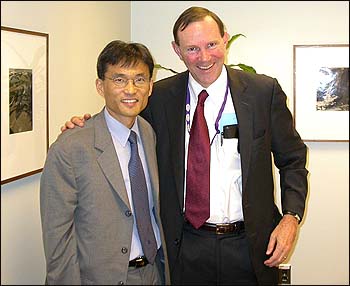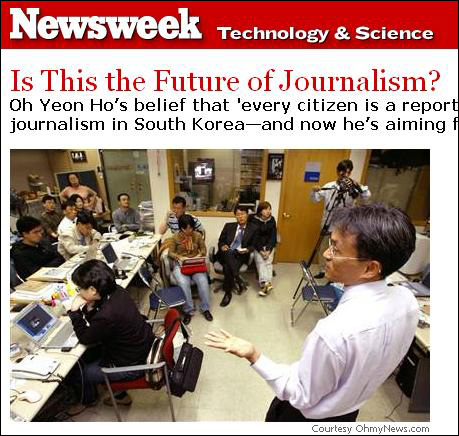|
 |  | | | ▲ 6월21일 오후 워싱턴 DC에 소재한 워싱턴포스트 사무실에서 오마이뉴스 오연호 대표와 워싱턴포스트 도널드 그레이엄 회장이 1시간여동안 면담을 갖고 오마이뉴스가 만들어낸 새로운 저널리즘과 양사의 협력방안 등에 대해 논의했다. | | | ⓒ 민경진 | 오연호 오마이뉴스 대표는 지난 6월21일 미국 워싱턴D.C.에서 워싱턴포스트 도널드 그레이엄(Donald E. Graham) 회장과 만나 오마이뉴스에 대해 설명하고 양사의 상호 협력방안에 대해 논의했다.
그레이엄 회장의 초청으로 이뤄진 이날 만남은 워싱턴포스트 사무실에서 이날 오후 4시40분부터 6시까지 1시간 30분가량 이뤄졌다.
오마이뉴스쪽에서는 오연호 대표와 민경진 오마이뉴스 국제사업팀장이 참석했으며 워싱턴포스트쪽에서는 그레이엄 회장과 캐롤라인 리틀(Caroline H. Little) 워싱턴포스트 닷컴 사장, 제럴드 로스버그(Gerald M. Rosberg), 크리스토퍼 마(Christopher MA) 워싱턴포스트 부사장 등 워싱턴포스트 최고 경영진 6명이 참석했다.
그레이엄 회장은 이날 "오마이뉴스의 모델은 우리뿐 아니라 세계가 주목할 만큼 매우 독창적이며 오마이뉴스가 한국에서 이뤄놓은 업적은 대단한 것"이라면서 오마이뉴스의 시민기자 시스템 운영방식과 단기간에 매체 영향력을 키운 비결에 대해 질문했다.
오연호 대표는 "오마이뉴스는 '모든 시민은 기자다'는 컨셉으로 시민참여 저널리즘을 본격화하고 있으며 한국사회를 개혁하려는 젊은 사람들의 목소리를 반영해왔다"고 설명하면서 오마이뉴스 모델의 세계 적용 가능성 여부에 대해 설명했다.
그레이엄 회장 등 워싱턴포스트 관계자들은 미국에서 유행중인 블로그와 오마이뉴스의 시민기자제도의 차이점이 무엇인지에 대해 큰 관심을 나타냈다. 이에 대해 오 대표는 "블로그는 개인적인 측면이 강한 반면 오마이뉴스는 시민기자들의 뉴스연대와 상근기자들의 심층보도 등을 결합해 세상을 바꿔나가는 측면이 강하다"고 설명했다.
워싱턴포스트 관계자들은 오마이뉴스 모델이 미국을 비롯해 다른 나라에서 어느 정도 실현될 수 있을지, 시민기자의 기사와 상근기자의 기사에 대한 독자의 반응 차이가 있는지, 시민기자의 기사에 대한 정확성과 신뢰도 문제를 어떻게 해결하고 있는지 등에 대해 질문했다.
또 오마이뉴스의 수익구조는 어떻게 이뤄져 있는지, 시민기자가 동영상을 어느 정도 활용하는지, 오마이뉴스의 편집철학과 정치적 입장은 어느정도 지면에 반영되고 있으며 그것이 독자확보와 수입에 미치는 장단점은 무엇인지 등에 대해 질문했다.
오마이뉴스에 대한 설명을 마친 후 양사 관계자들은 "서로 배울 것이 많다"면서 향후 오마이뉴스와 워싱턴포스트간의 가능한 협력관계에 대해 논의했다. 양측은 앞으로 추가 접촉을 통해 이번 모임에서 제기된 몇가지 협력방안에 대해 구체적인 논의를 계속하기로 했다.
한편 워싱턴포스트의 자회사인 시사주간지 <뉴스위크> 인터넷판은 6월18일 오연호 대표를 심층 인터뷰한 기사 <오마이뉴스, 언론의 미래인가 - Is this the future of journalism?>를 실었다.
다음은 <뉴스위크> 인터넷판 기사의 전문.
Is This the Future of Journalism? - Newsweek
Oh Yeon Ho's belief that 'every citizen is a reporter' has changed journalism in South Korea -- and now he's aiming for the world
WEB EXCLUSIVE
By Christopher M. Schroeder
 | | | | | | ⓒ Newsweek | | June 18 - Oh Yeon Ho is a lean, intense journalist who came of age during turbulent political unrest in Korea in the mid-'80s - and a media environment in which old-line and often conservative newspapers dominated the national scene. For a decade, Oh worked as a conventional magazine journalist, but in early 2000 he launched his own news site - just before the bursting of the Internet bubble. But unlike many startups, Oh's OhmyNews.com not only survived but thrived, based on the simple notion that "every citizen is a reporter." And now Oh's Internet creation has attracted the attention of media giants around the world who wonder: is this Korean start-up the future of journalism?
The initial premise is conventional: OhmyNews employs 25 trained reporters who cover the major news stories of the day. But the twist comes with another 10 editors who review and post as many as 200 articles written daily by nearly 33,000 "citizen journalists"- anyone who registers can submit a 750-word piece in exchange for a few dollars per story. If the article makes the "Top News" section, the payout is about $11.
"They are writing articles to change the world, not to earn money," says Oh. His contributors must agree to a code of ethics and eschew racism or pornography. Every story is posted instantly to the site. There is, however, an editorial hierarchy to the site's visual design. Hard news (by the site's professional journalists) and the most carefully edited citizen pieces are front and center, followed by softer stories like entertainment, quick community updates and finally, toward the bottom, stories not yet edited by OhmyNews. Most stories are also accompanied by rich and densely populated message boards.
OhmyNews has become one of the most influential news and information sites in Korea, with more than 750,000 unique users per day - this during a period when the leading newspapers' circulation dropped by a third. The site was widely credited with influencing South Korea's election of President Roh Moo-hyun; Roh granted his first postelection interview to OhmyNews. The later protest rallies that came with Roh's impeachment trial were covered in minute-by-minute detail, in text, photography and even video, by dozens of citizen reporters. Oh explains, "OhmyNews is a kind of public square in which the reform-minded generation meet and talk with each other and find confidence. The message they find here: we are not alone. We can change this society."
OhmyNews reached profitability last fall, driven primarily by advertising (ranging from small merchants to Samsung) with additional revenue from conferences, content licenses and voluntary donations from users. Although ad revenue is expected to grow 50 percent this year, Oh suspects that remaining profitable will remain a challenge. "I have to make money," he says, "but I am not an expert in that. Deep in my heart, I am still a reporter."
Critics from traditional news publishers in Korea charge that OhmyNews confuses message board posting with news, and that getting to the truth in any story requires painstaking reporting and editing by trained professionals. But OhmyNews's audience - primarily in their 20s and 30s - may not agree. When some Yonsei University students recently met with a visiting reporter to discuss the future of news, one psychology major put it simply: "How can you ever get truth from one source? The Internet allows us to check multiple sources, to explore message-board postings, to debate issues with others - that is the only way to find truth. And besides, what good is information if you can't react to it?" "We're not stupid," added a business student. "We know that there is a difference between a message board, a traditional journal and OhmyNews. But by putting them together, our understanding is better. We can piece together truth." Oh is quick to point out that in four years, Ohmynews has had to publish only four retractions and has never had any significant legal issues.
In some ways, Oh says, OhmyNews is a "special product of Korea." Koreans had relatively little public access to open and free dialogue and a large portion had grown dissatisfied with the mainstream conservative media. In addition, Korea's small size makes news coverage more manageable - one of Oh's professional journalists is rarely more than a few hours away from where a citizen journalist is reporting. Korea is also, in Oh's words, "a unipolar society, where the entire country can be engulfed by just a couple of issues." And finally, the nearly 70 percent penetration of broadband Internet access in Korea allows users to engage more readily; Oh can also experiment in multimedia offerings such as OhmyTV and Web radio.
Despite these unique factors in Korea, Oh strongly believes that there is a global need to broaden the definition of news consumption and has recently launched OhmyNews International in English.
Will he find a willing audience in the United States? American television audiences are already familiar with "citizen witnesses" supplying news footage, from Rodney King to September 11. Online, from eBay to Craigslist.org, individuals are self-publishing commercial enterprises, and Weblogs have become a national hobby. On a more organized scale, About.com offers how-to advice from hundreds of self-posting experts around the nation, and Wikipedia.com is a self-posting encyclopedia where more than 6,000 active contributors have submitted 600,000 articles on countless topics.
So is a more active participation and interaction with news far behind? Oh thinks so. But he is quick to caution: "Technology itself cannot change society. Korean citizens were ready to participate. Only prepared people, who can use the merits of technology, can make a difference."
|
|